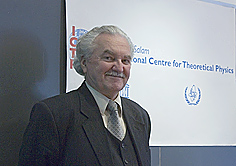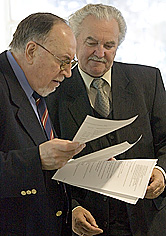Personal tools
News from ICTP 116 - Profile

Ryszard Struzak, long-time staff member of the International Telecommunication Union (ITU), has launched a second career in electronic communications at ICTP.
Forever Young

Ryszard Struzak
At first glance, his collar-length
silvery hair seems to belie his youthful exuberance.
But since 1989, Ryszard Struzak, now 73, has been one of
ICTP's most frequent and enthusiastic visitors-first serving as
teacher for the Centre's radiocommunication courses and later
as co-director of the ICTP schools on digital radio and wireless
computer networking. While at the Centre, Struzak has worked closely
with Sandro Maria Radicella, head of the Aeronomy and Radiopropagation
Laboratory (ARPL).
ICTP's most recent wireless networking school took place in February.
Some 26 participants from 15 developing countries attended.
In Africa and in many regions of Asia and Latin America, low-cost
radiocommunication technologies are the most cost-effective means
to connect remote villages, universities and hospitals to the
internet. For example, a simple antenna attached to a tin can---a
cantenna, if you will---has helped bring the internet to universities
across sub-Saharan Africa. Thanks to Struzak and Radicella, ICTP
has been one of the world's leading organisations in making wireless-communication
science and technology available to developing countries. The
work of the Centre recently received worldwide attention when
it was profiled in the 28 February edition of the International
Herald Tribune (see p.
8).
The Centre's activities in the field are strongly supported by
the International Telecommunication Union (ITU), a UN agency where
Struzak worked for more that two decades until his retirement
in 2003. Born in Janow, a small city near Lublin in Poland, Struzak
studied at universities in Lodz, Wroclaw and Warsaw, where he
received doctorate degrees in both electronics and telecommunications.
His education set the stage for a long and rewarding career as
a university professor and international civil servant.
"My collaboration with ICTP," Struzak says, "began
in January 1989, when the Centre organised its first Course on
Basic Telecommunication Science, but I had previously met Radicella
at ITU headquarters in Geneva. From our first conversations I
understood the spirit of the Centre."

Ryszard Struzak with Sandro Maria Radicella
With Struzak's help, ICTP organised radiocommunication courses
every other year until 1995, when more formal links were developed
with ITU. From then on, courses became annual events with topics
changing from one year to the next to keep pace with the rapid
advances in the field. Hundreds of young physicists and engineers
have attended the Centre's radiocommunication courses, colleges,
workshops and schools---mostly from African countries.
Why the emphasis on Africa? "Because it is a continent that
must become connected to the rest of the world if it hopes to
achieve sustainable economic progress," Struzak says. "For
me and Radicella it's rewarding to see how researchers attending
the courses learn new things that they subsequently use in their
home countries. Their level of preparation today is much better
than it was 15 years ago. This too can be seen as a sign of hope
for Africa."
In the near future ICTP plans to help forge partnerships between
India and several African countries. Struzak notes that South-South
cooperation in science is just "one more sign of the progress
that is taking place across the developing world---thanks in large
measure to advances in electronic communications driven not only
by satellites and optical fibres but also by tin cans and aluminium
antennae."